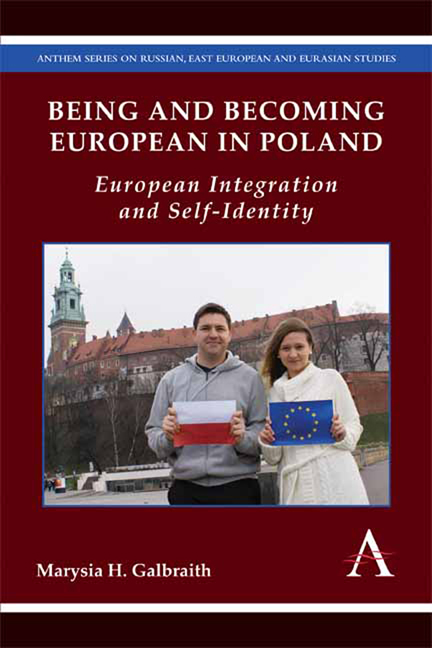Book contents
- Frontmatter
- Contents
- List of Figures and Tables
- Acknowledgments
- Chapter 1 Introduction: Being and Becoming European in Postcommunist Poland
- Chapter 2 “We Have Always Been in Europe”: Deploying the Past to Shape the Present
- Chapter 3 “Unbelievable! Poles Are Happy”: Looking toward the Future
- Chapter 4 “We're European because We're Polish”: Local, National and European Identities
- Chapter 5 “EU Membership Gives Poland a Better Chance”: Perspectives on European Integration
- Chapter 6 “Now We Can Travel without a Passport”: Mobility in the European Union
- Chapter 7 “This Region Is Our Priority”: EU Subsidies and the Development of a Transnational Regional Community
- Chapter 8 Conclusion: Coming of Age in Europe
- Appendix: List of Participants
- Notes
- References
- Index
Chapter 8 - Conclusion: Coming of Age in Europe
Published online by Cambridge University Press: 03 November 2017
- Frontmatter
- Contents
- List of Figures and Tables
- Acknowledgments
- Chapter 1 Introduction: Being and Becoming European in Postcommunist Poland
- Chapter 2 “We Have Always Been in Europe”: Deploying the Past to Shape the Present
- Chapter 3 “Unbelievable! Poles Are Happy”: Looking toward the Future
- Chapter 4 “We're European because We're Polish”: Local, National and European Identities
- Chapter 5 “EU Membership Gives Poland a Better Chance”: Perspectives on European Integration
- Chapter 6 “Now We Can Travel without a Passport”: Mobility in the European Union
- Chapter 7 “This Region Is Our Priority”: EU Subsidies and the Development of a Transnational Regional Community
- Chapter 8 Conclusion: Coming of Age in Europe
- Appendix: List of Participants
- Notes
- References
- Index
Summary
As I was preparing for my sabbatical in 2005 after not visiting Poland for five years, I had a dream, a nightmare really, that I landed in Krakow only to find that Poland was no longer any different from the US. There were the same stores, the same advertisements and the same day-to-day preoccupations. The dream left me with an uneasy feeling until my actual arrival; I was quickly reassured by the checkerboard fields visible from the air, the drive into the city on narrow country roads and the visitors who came to see me as soon as they knew I had returned. What makes a place distinctive can be hard to identify, and even harder to put into words. Nevertheless, that specialness of place, particularly in a city like Krakow and a region like the Bieszczady Mountains, is undeniable; it is perceived through the senses, producing an aesthetic response. Every time I return to Poland, I see more of the trappings of modern development – shopping malls, big-box stores, traffic jams, suburban neighborhoods, Ikea renovations, iPads – but they exist in juxtaposition to places and people also shaped by Poland's particular historical trajectory. In other words, it is hard to talk about Europeanization (or Americanization, or globalization) without also taking note of the disjunctures and differences specific to Poland, and the powerful force of Polish culture and history. Throughout this book, I have shared a coming-of-age story that is situated within a particular time and place. I have traced two trajectories of change over a 20-year period – across the life course of participants from youth to adulthood, and in Poland from the fall of state socialism through EU integration. Ongoing contact with Poland reassures me that artifacts of place are resilient, and economic development and global integration need not destroy cultural distinctiveness.
The point of person-centered research is to listen to a diversity of voices, situated in the particular details of individual lives, and trace the constellations of debate about key cultural phenomena that emerge in participants’ selfreflections. Participants are creative agents, reacting to top-down discourse and practices and making their own choices, either self-consciously or via their actions.
- Type
- Chapter
- Information
- Being and Becoming European in PolandEuropean Integration and Self-Identity, pp. 193 - 202Publisher: Anthem PressPrint publication year: 2014



